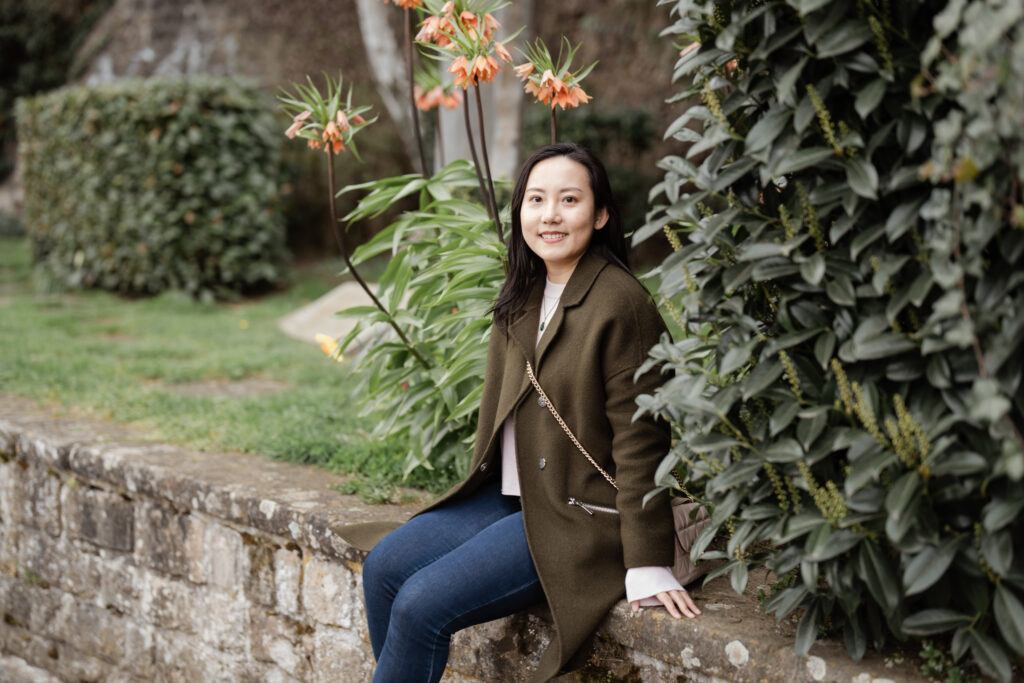In September 2015, Cheng Jiang (30) left China for the first time and headed to Luxembourg. “When you study finance, you know Luxembourg. You know it’s an important cross-border financial centre.” However, that was the extent of her knowledge at the time. Before she moved, Cheng never imagined that this country in the heart of the EU would be home eight years later and offer her a future far from the life she had imagined since childhood.
Cheng enjoys both the international character of Luxembourg’s capital as well as its peaceful aspects. “I can embrace so many different lifestyles here, from pop concerts and classic music, to walking in the forest as well as dancing in clubs and bars. There’s a wide variety of possibilities and choices.”
The green areas of the capital give her the opportunity to engage in another favourite activity, riding her bike or running. She also likes being around animals, although living in a flat can make this difficult. She therefore spends part of her free time walking dogs in a local animal shelter. “Soon after I discovered that half of my team started to do the same,” she said joyfully.
LFF: What was the trigger that made you come to Luxembourg?
Cheng Jiang:
I come from a middle-class family and grew up in Chifeng, a small town in Inner Mongolia. I grew up expecting to live a specific kind of life – study, work, and have a family. However, I discovered that my university in China had an exchange programme with the Luxembourg School of Finance and I jumped at the opportunity to participate to see more of the world. The trip to Luxembourg in September 2015 was my first international experience. Following the exchange, I joined Schroders in Luxembourg as an investment risk intern and have continued to build my career at the company, where I’m now an Investment Risk Manager.
LFF: China to Luxembourg is a large jump between two very different cultures and locations. Did you encounter any particular problems in adapting?
Cheng Jiang:
The biggest challenge was definitely the language. I didn’t speak French, German or Luxembourgish when I arrived and while English is widely spoken knowing one of the others definitely helps. Unsurprisingly, in the eyes of a newcomer there were a lot of differences, especially from Beijing where I lived for five years before coming to Luxembourg. The city itself is six times bigger than the country of Luxembourg with 33 times more population. With that many people, the city never sleeps and the traffic, air quality, and noises can be overwhelming sometimes. In contrast to Beijing, Luxembourg is much calmer. Life is generally more measured and relaxing. Adapting to this wasn’t too difficult though as I had a great group of international friends at the university.

In contrast to Beijing, Luxembourg is much calmer. Life is generally more measured and relaxing. Adapting to this wasn’t too difficult though as I had a great group of international friends at the university.

LFF: China to Luxembourg is a large jump between two very different cultures and locations. Did you encounter any particular problems in adapting?
Cheng Jiang:
The biggest challenge was definitely the language. I didn’t speak French, German or Luxembourgish when I arrived and while English is widely spoken knowing one of the others definitely helps. Unsurprisingly, in the eyes of a newcomer there were a lot of differences, especially from Beijing where I lived for five years before coming to Luxembourg. The city itself is six times bigger than the country of Luxembourg with 33 times more population. With that many people, the city never sleeps and the traffic, air quality, and noises can be overwhelming sometimes. In contrast to Beijing, Luxembourg is much calmer. Life is generally more measured and relaxing. Adapting to this wasn’t too difficult though as I had a great group of international friends at the university.
LFF: What made you decide to pursue a career as an investment risk manager at Schroders in Luxembourg?
Cheng Jiang:
Luxembourg is well-known for setting up and administering investment structures. It also has a strong focus on oversight functions, acting as a center of excellence for regulatory, risk and compliance. It was natural to look in this direction when I had to look for an internship. My background and degrees in both economics and applied mathematics are also particularly well-suited to the investment risk area as it requires both analytical skills and a solid knowledge of financial markets. Additionally, when discussing with alumni from the university, I was given some valuable advice about pursuing a career in this field. As a global player with a strong presence in Luxembourg, Schroders offers a lot of opportunities and became my first choice.
LFF: How do you see your career developing over the next few years?
Cheng Jiang:
I truly enjoy what I do so I plan to continue focusing on risk management. The sector continues to evolve, for example, the continuous enhancement of the regulatory framework. Starting from the global exposure to liquidity stress testing, to sustainable financial disclosures, we’ve seen the rapid development of regulatory frameworks in reaction to changing market dynamics. I definitely believe this will continue. Secondly, innovation, technology and a broader view of investments will change our way of working and shape our way of thinking. During my 7 years at Schroders, there’s been a notable development from traditional public assets to a broader asset mix, impact investments and digital assets. Finally, sustainability has shifted from a blurry concept to a concrete framework and will continue to be one of the most important topics in investments and finance overall. All of these, along with other factors have already, and are likely to continue to bring new challenges and opportunities in the risk management field.

My background and degrees in both economics and applied mathematics are also particularly well-suited to the investment risk area.

LFF: We often hear that risk management functions are in short supply in Luxembourg. Can you confirm this?
Cheng Jiang:
A good risk manager can bring exceptional value to a firm. Based on my experience involving recruiting for the team, it takes a lot of time and effort to find the right candidate. Luxembourg is a center of excellence on governance and oversight, and there have been a lot of changes and challenges in risk management activities in the country. This means that competitive risk managers with a comprehensive understanding of the regulatory framework as well as how risk will impact day-to-day activities are in high demand.
LFF: What advice would you give to people starting their career in the risk management sector?
Cheng Jiang:
I think the first thing to do is to consolidate your knowledge of the fundamentals before moving into a more specific field. It is important to cultivate a “risk management mindset” by being exposed to a broad range of related topics. It’s also important for those looking to have a career in this area to stay curious and be forward-looking, even if the future trends are not (yet) directly impacting day-to-day activities. Establishing a deep understanding once you have the fundamentals is critical. Risk management involves a lot of day-to-day responsibilities. However, it is important to go beyond the procedures to understand the basis of the tasks, their underlying framework, and explore possibilities of improving efficiency. Finally, do not hesitate to network: talk to people and participate in various forums and career events that are frequently held in Luxembourg.

Luxembourg is a center of excellence on governance and oversight, and there have been a lot of changes and challenges in the risk management activities in the country.
LFF: To conclude, what has been the biggest investment in yourself thus far?
Cheng Jiang:
I consider obtaining profession certificates one of the most effective investments in myself. First of all it helps to consolidate the knowledge that can be leveraged on almost every working day. Notably, they also stand out on your CV, increasing your chances of getting job interviews. However, the benefits are far wider than this.
They provide you with the opportunity to join corresponding professional societies where you can engage in seminars and networking events. This continuous deepening of your knowledge, keeping up with topics and participating in career talks brings much greater value than the one-off effort to take the exams.
Beyond this, another investment in myself I’m currently undertaking is the strengthening of my language skills which is quite relevant, and the exposure I get in Luxembourg helps ! I’m currently learning French and I hope it will open up new aspects of both personal and professional development for me.


